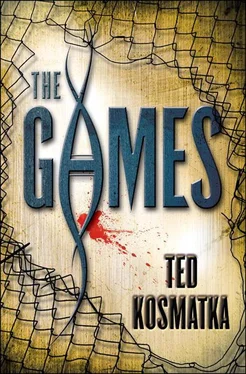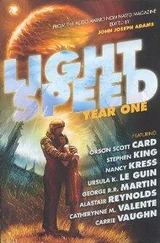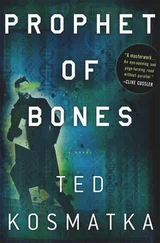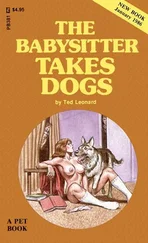Against the far wall, several large, roughly hewn trees leaned at forty-five-degree angles with wide platforms connecting them at varying heights from the ground. Large wooden poles lay scattered in the straw that covered the floor of the enclosure. Thick ropes ran in sagging parabolas between points on the wall and the wooden poles. It all looked like a playground for some very rough, very big little boy.
“I don’t see our little friend,” Baskov said.
“It’s in an adjacent pen, but it isn’t so little anymore,” Silas said. “We thought it best to introduce the goat first.”
There was a loud clang. Then, as if on cue, a small black-and-white goat was pushed unceremoniously through a hatch in the far wall.
It fumbled around in the deep straw for several moments. Slowly, its ability to wallow around in the stuff improved, and the goat made slow progress across the enclosure, jumping from spot to spot. Another clang grabbed the goat’s attention. It stopped, angling its head toward the sound.
The large metal door at the back of the enclosure slid slowly upward.
The gladiator lumbered in beneath it. The growth of the organism had been nothing short of amazing, and Silas couldn’t help but feel a wave of awe as the creature stepped into sight. Even hunched in a predatory stance, it stood easily six and a half feet tall—and it wasn’t done growing yet. The arms were thick with muscle, and the ears now stood round and erect atop the head, like a bat’s.
Only its eyes had not changed. Still large, gray, unreadable. Silas’s heart jolted in his chest when the gladiator bounded across the lake of straw and leaped to the lowest platform. There it sat, looking down at the goat, then out at the people, appearing for all the world like some fairy-tale monster come to life.
Its arms stretched wide from its body, and the wings unfurled from their hiding place against its back, extending twelve feet on either side. There was a rush of wind as the wings began to beat at the air. Silas felt the breeze on his cheek and turned to look at Baskov, who stood open-mouthed at the spectacle.
Silas turned his attention back to the creature in time to see it leap from the platform and drop, half gliding, to the straw next to the goat.
Bleating wildly, the goat sprang backward all the way to the bars. The gladiator’s wings snapped shut against its back as it took a long step forward. The frightened goat bleated again and tried to run past the gladiator on the right, but the gladiator flashed an arm out in front of it. The goat stopped just a half-dozen feet in front of Silas, pinned between the bars and the strange creature. The gladiator cocked its head sideways, looking at it. Slowly, it extended one taloned hand and touched the goat’s furry coat with its palm, almost a caress. The goat shrieked in fear and pulled away while the creature cocked its head in the other direction.
Much later, in the report he would have to write anyway, Silas would not be able to recount what happened next except to say that in one moment the gladiator was sitting near its potential prey, and in the next, after a flash of motion, the goat was somehow partially disassembled in the gladiator’s bloody hands. Bright loops of intestine spilled out from the forward half of the goat as the gladiator raised the carcass up and bit off the head in a single crunch of bone.
It happened so fast.
Silas watched in silence as the creature fed. Minutes later, he was the first to speak. “Well, that was—”
The gladiator’s growl stopped him in mid-sentence. Its head snapped up as if offended by the interruption. An instant later, the uneaten portion of the goat slammed against the bars, splattering blood and bowels over him and those with the misfortune of standing too close to him.
Vidonia turned without a word and walked out. As Silas looked down at his fouled lab coat, the creature reared its head back and howled. To Silas, the howl sounded very much like laughter.
Her voice carried accusation in it, and something else. He tried to gauge her. They sat at the picnic tables just outside the lab, pushing food around on their plates.
He’d known there was something brewing beneath the surface for several weeks now. It was in the tone of her voice when she spoke of the project. It was in her careful choice of wording. Most of all, it was in the things she didn’t say. Is she finally going to let it show? Is she finally going to say it?
They’d been talking for ten minutes now, circling the real point with their conversation. The wind had turned cold, and Silas raised his collar against the chill on his neck. Perhaps a lunch outside on the picnic tables hadn’t been such a good idea, after all.
“What are you getting at?” he asked. He was tired of avoidance.
“I’m saying that it’s too bad it has to end up as so much pulpy sawdust at the bottom of the arena,” Vidonia said.
Silas studied her face.
“I’m saying that it’s too bad it has to die,” she said.
“It’s why it’s here in the first place.”
“I know. That doesn’t make it less of a stupid waste.”
“You have a problem with the gladiator competition?”
“Yes,” she said, without hesitation.
Silas looked at her.
“This is your project,” she said. “I understand that. But I don’t understand the kind of man that destroys his creations.”
“I don’t destroy them.”
“Yes, you do.”
“The competition does that.”
“And your project is part of that competition.”
“Without the competition, those creations you speak so highly of wouldn’t exist at all.”
“That creature you’ve made is like nothing else that has come before. It’s unique and should be studied, not thrown away in blood sport.”
“You are studying it.”
“For what? Even the winners usually die of their injuries. And the ones that don’t die are just put down later. There are no old gladiators.” She looked away into the wind, a soft expression on a sharp profile. She took a slow sip of her Coke. “All this talent, all this scientific knowledge, and all we can think to do with it is to build a better killer.”
Several wasps hovered in slow circles over the picnic table, attracted by the food and moving sluggishly in the cold air. He swatted at one that came too close and missed, sending it spinning in a wash of air. “Have you ever heard of the pit bull terrier?” he asked finally.
“What?”
“The pit bull terrier?”
“Some kind of dog?” she said. She seemed irritated by the off-subject question.
“I didn’t think you would have. It was finally outlawed about ten years ago, after decades of bans and regulation. Even back when they’d still been legal to own, insurance liability made it impractical to do so. Fanciers strove for years to rehabilitate the breed’s image, but too late, and with too little consistency, and the breed died of its own bad reputation.”
“So they’re extinct?”
“The breed is extinct. The genes no doubt still live on in mixed-breeds and family pets all over the place—it’s hard to regulate that stuff, after all—but there’s no AKC recognition, and the moment you call a dog a pit bull, it’s illegal. So maybe you call it something else, give it a new name. Or maybe you don’t call it anything. But still, the breed—that old name—is dead.”
“What does that have to do with the gladiator competition?”
“More than you might think. Pit bulls came from London originally—the inadvertent hybrids of bull-baiting dogs and early proto-terriers. The combination was deadly. The original baiters were used to fatigue cattle into submission for slaughter. These dogs had big, musclebound heads, and their instinct was to attack livestock—clamp their jaws onto a bull’s face and then not let go, no matter what.”
Читать дальше












